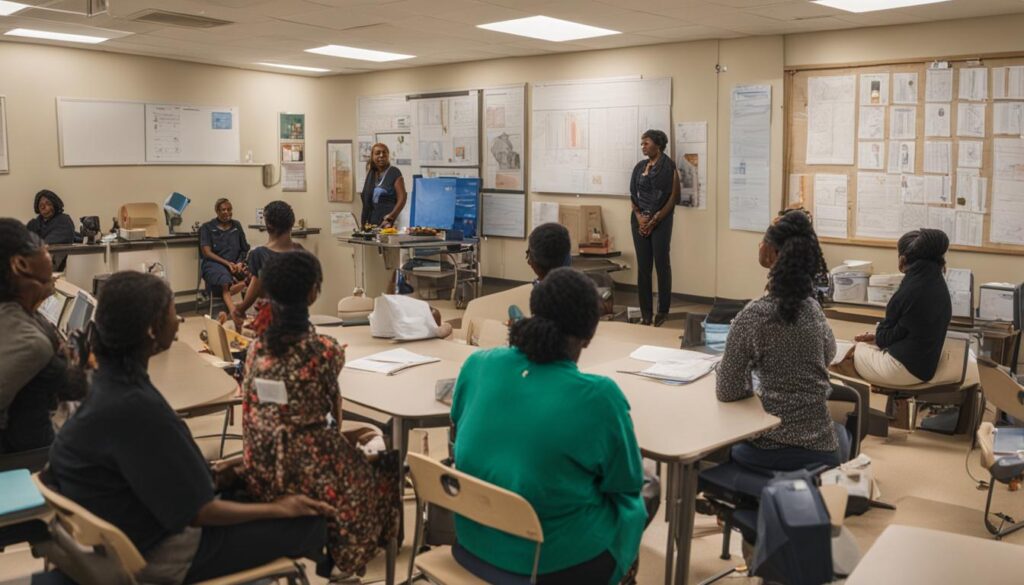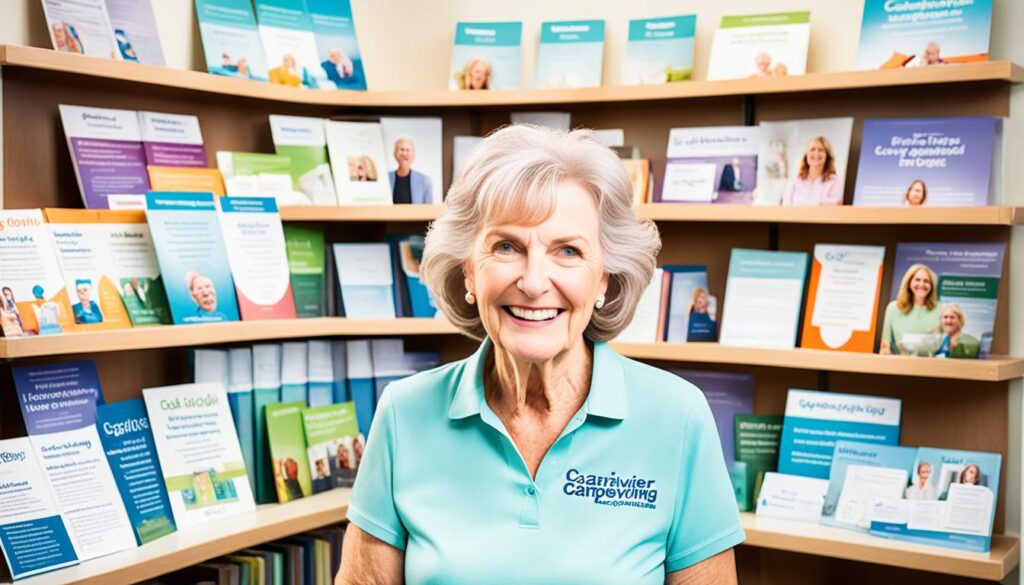Did you know that there are more than 53 million caregivers in the United States who provide vital support to their family and friends? Despite being a vital part of our community, the role of caregiving is frequently ignored and undervalued.
As caregivers, we understand the immense responsibility and commitment it takes to care for someone in need. Whether it’s providing assistance to an aging parent, supporting a family member with a chronic illness, or looking after a loved one with a disability, the caregiving journey is filled with both challenges and rewards.

In this article, we will delve into the world of caregiving, shedding light on the industry’s intricacies, exploring the roles and responsibilities of caregivers, and providing valuable insights into the challenges they face. By understanding the caregiver industry, we can gain a deeper appreciation for the critical work that caregivers do every day and explore ways to support them in their caregiving journey.
Key Takeaways
- There are over 53 million caregivers in the United States.
- Caregiving is a fundamental aspect of our society, providing essential support to loved ones.
- The caregiving journey is filled with both challenges and rewards.
- Understanding the caregiver industry is crucial to appreciating the critical work that caregivers do.
- Supporting caregivers is essential to their well-being and the quality of care they provide.
The Evolving Landscape of Caregiving
The field of caregiving is constantly evolving, catering to the changing needs of aging populations. As the demand for elder care continues to grow, the caregiving industry has witnessed significant transformations and trends. In this section, we will explore the current state of the caregiving industry and discuss the emerging challenges faced by caregivers.
Caregiving Industry
The caregiving industry encompasses a wide range of services and professionals dedicated to providing care and support to individuals in need. From in-home caregivers to assisted living facilities, the industry plays a vital role in ensuring the well-being of aging populations.
Caregiving Trends
Keeping up with caregiving trends is essential for both caregivers and those requiring care. By staying informed, caregivers can enhance their skills and adapt to the ever-changing needs of care recipients. Similarly, individuals in need of care can benefit from the advancements in caregiving practices and services.
Elder Care Trends
The aging population has led to a surge in the demand for elder care services. This has resulted in the development of innovative care models and the introduction of technology to support elderly individuals. From telehealth solutions to senior-friendly home renovations, elder care trends focus on promoting independence, enhancing quality of life, and ensuring the safety of seniors.
“The field of caregiving is continuously evolving to meet the diverse and evolving needs of individuals requiring care. Keeping up with the latest trends helps caregivers provide the best possible support and care to their clients.”
Emerging Challenges
While the caregiving industry continues to progress, it also faces various challenges. With an aging population and an increasing demand for care, the industry must address issues such as caregiver shortages, workload management, and caregiver burnout. These challenges call for innovative solutions and policies to support caregivers and improve the overall caregiving landscape.

Caregiver Roles and Responsibilities
Caregivers play an essential role in providing care and support for the elderly and individuals in need. As family caregivers or professionals in the caregiver job market, their responsibilities encompass a wide range of tasks to ensure the well-being of their care recipients.
Family Caregiver
Family caregivers are individuals who provide care and support for their loved ones. This can include immediate family members, such as spouses, children, or siblings, as well as extended family members. As a family caregiver, the responsibilities may include:
“Being a family caregiver is a deeply rewarding experience, but it also comes with significant responsibilities. I became the primary caregiver for my aging parent and dedicated myself to their well-being.”
- Assisting with activities of daily living, such as bathing, dressing, and grooming
- Administering medication and managing medical appointments
- Providing emotional support and companionship
- Managing household tasks, including meal preparation and housekeeping
- Monitoring health conditions and communicating with healthcare professionals
Caregiver Job Market
The caregiver job market offers employment opportunities for individuals who choose caregiving as a profession. These caregivers work in various settings, including hospitals, nursing homes, assisted living facilities, and private residences. The roles and responsibilities in the caregiver job market may include:
- Assisting with personal care and hygiene
- Administering medication and monitoring health conditions
- Providing companionship and engaging in recreational activities
- Assisting with mobility and physical therapy exercises
- Supporting with meal planning and preparation
No matter the caregiving role, caregivers provide physical, emotional, and logistical support to ensure the comfort and well-being of their care recipients.
| Family Caregiver | Caregiver Job Market |
|---|---|
| Assistance with activities of daily living | Personal care and hygiene support |
| Medication management | Administration of medication |
| Emotional support and companionship | Providing companionship |
| Household tasks | Assisting with meal planning and preparation |
| Health condition monitoring | Assisting with physical therapy exercises |
As the demand for caregivers continues to grow, both family caregiving and professional caregiving play crucial roles in ensuring the well-being of our aging population.

Training and Education for Caregivers
To ensure quality care, caregivers require proper training and education. At [Brand Name], we understand the importance of equipping caregivers with the knowledge and skills they need to provide exceptional care. Our comprehensive caregiver training programs are designed to empower caregivers with the necessary tools and expertise to excel in the field of professional caregiving.
Our caregiver training programs go beyond the basics, offering in-depth courses that cover a wide range of topics including:
- Understanding the physical and emotional needs of care recipients
- Effective communication strategies
- Safe medication administration
- Managing challenging behaviors
- Providing personal care with compassion and dignity
“Our caregiver training programs are designed to empower caregivers with the necessary tools and expertise to excel in the field of professional caregiving.”
We believe that hands-on experience is a crucial part of caregiver education. That’s why our training programs incorporate practical training sessions where caregivers can apply what they have learned in real-life scenarios. This practical experience helps caregivers develop confidence and competence in providing care.
Our commitment to caregiver education extends beyond the training programs. We offer ongoing support and resources to help caregivers stay updated with the latest industry practices and advancements. Through workshops, seminars, and access to educational materials, caregivers can continue their professional development and enhance their caregiving skills.
Testimonial: A Caregiver’s Perspective
“The caregiver training program at [Brand Name] provided me with the knowledge and skills to deliver exceptional care to my clients. The practical training sessions allowed me to practice what I learned, and the ongoing support from the organization has been invaluable. I feel confident in my abilities as a professional caregiver, thanks to the comprehensive training provided by [Brand Name].” – Sarah Thompson, Certified Caregiver

Investing in caregiver training and education is essential for the well-being of both caregivers and care recipients. By equipping caregivers with the necessary skills and knowledge, we can ensure that they provide the best possible care to those in need. At [Brand Name], we are committed to elevating the standards of professional caregiving through our comprehensive caregiver training programs.
Navigating Caregiver Support Resources
Being a caregiver can be demanding, both physically and emotionally. As caregivers, we understand the challenges and the need for support throughout the caregiving journey. That’s why it’s essential to be aware of the various caregiver support resources available to us.
1. Support Groups
Joining a caregiver support group can provide us with a sense of community and understanding. These groups offer a safe space to share experiences, exchange advice, and receive emotional support from others who are going through similar experiences.
2. Online Forums and Communities
Online forums and communities provide a virtual support network for caregivers. These platforms allow us to connect with caregivers from around the world, ask questions, and find relevant information and resources.
3. Respite Care Services
Caring for others can sometimes be overwhelming, and we all need a break from time to time. Respite care services offer temporary relief to caregivers, allowing us to recharge and take care of our own well-being.
4. Caregiver Education and Training
Continuing education and training resources are invaluable for caregivers. These resources can enhance our caregiving skills, provide insights into specific conditions or challenges, and equip us with the knowledge needed to provide the best care possible.
5. Financial Assistance Programs
Financial support resources may be available to caregivers who are facing financial difficulties. These programs can help cover caregiving costs, provide access to medical equipment, or offer financial aid for necessary services.
6. Caregiver Apps and Technology
Advancements in technology have given rise to caregiver apps and digital tools that can streamline caregiving tasks, track medications, monitor health conditions, and provide easy access to vital information. These digital solutions can help simplify and organize our caregiving responsibilities.
7. Community and Government Organizations
Many community and government organizations offer caregiver support programs and services. These organizations can provide information, counseling, respite care, and referrals to other valuable resources.
Remember, as caregivers, we don’t have to navigate this journey alone. By utilizing the available caregiver support resources, we can find the assistance, guidance, and understanding we need to provide the best care possible while taking care of ourselves.

Challenges in the Caregiver Industry
In the caregiver industry, caregivers face numerous challenges as they strive to provide quality care and support to those in need. These challenges not only impact individuals directly involved in caregiving roles but also have far-reaching effects on society as a whole.
One of the primary caregiving challenges is the lack of resources and support. Many caregivers find themselves overwhelmed by the demands of their role and struggle to find the necessary resources to navigate their caregiving journey effectively. This can lead to feelings of frustration, stress, and burnout.

Additionally, caregiver industry challenges also include financial constraints. Caregivers often face financial instability due to reduced work hours or leaving their job entirely to provide care. The financial burden can be significant, impacting not only the caregiver’s livelihood but also their long-term financial security.
Furthermore, the emotional toll of caregiving cannot be understated. Caregivers often experience emotional distress, anxiety, and caregiver fatigue due to the constant demands and responsibilities of caring for others. This emotional strain can have a detrimental impact on their overall well-being.
We understand the challenges that caregivers face in the industry. Our goal is to provide them with the necessary support, resources, and guidance to navigate these challenges and experience a fulfilling caregiving journey.
To address these challenges, it is crucial to ensure that caregivers have access to comprehensive training and education programs. By equipping caregivers with the necessary skills and knowledge, we can empower them to provide the best care possible while also protecting their mental and physical well-being.
Additionally, caregiver support networks and organizations play a vital role in addressing the challenges faced by caregivers. These networks provide a platform for caregivers to connect, share experiences, and access valuable resources and support services.
In conclusion, as we explore the challenges in the caregiver industry, we recognize the need for concerted efforts to address these hurdles and create a supportive environment for caregivers. By acknowledging and addressing these challenges, we can ensure that caregivers receive the support they deserve and continue to make a significant positive impact on individuals and society as a whole.

Trends in Senior Care Services
As the elderly population continues to grow, the demand for senior care services also increases. At our senior care facility, we understand the importance of providing high-quality care for older adults. In this section, we will explore the current trends in senior care and discuss the available long-term care options.
Homecare Services
One of the rising trends in senior care is the preference for homecare services. Many seniors prefer to age in the comfort of their own homes, surrounded by familiar surroundings and memories. Homecare services offer personalized care, allowing older adults to receive assistance with daily activities while maintaining their independence.
Our dedicated team of caregivers offers a range of homecare services tailored to meet the unique needs of each individual. From meal preparation and medication management to companionship and mobility assistance, we strive to enhance the quality of life for seniors in the comfort of their own homes.

Long-Term Care Options
In addition to homecare services, there are various long-term care options available for seniors. These options offer more comprehensive care for individuals who require around-the-clock support and supervision.
| Long-Term Care Facility | Assisted Living | Memory Care |
|---|---|---|
| Provides a safe and supportive environment for seniors who require assistance with activities of daily living. | Offers a community setting with personalized care and support services for seniors seeking an active lifestyle. | Specializes in caring for individuals with Alzheimer’s disease and other forms of dementia, providing specialized memory care programs and secure environments. |
| A team of qualified professionals is available to provide 24/7 care and support. | Residents have access to a range of amenities, including communal dining, social activities, and transportation services. | Memory care programs focus on promoting cognitive function and maintaining a sense of familiarity and routine. |
| Residents receive assistance with medication management, personal care, and other daily living tasks. | Assisted living communities promote independence while ensuring seniors have access to support when needed. | Memory care communities have specialized staff trained in dementia care and tailored therapies. |
Choosing the right long-term care option depends on various factors, including the individual’s care needs, preferences, and budget. Our team of experts can guide families through the decision-making process and help identify the most suitable care setting for their loved ones.
Overall, the trends in senior care services are focused on personalized care, maintaining independence, and enhancing the quality of life for older adults. The goal is to provide seniors with a safe and supportive environment where they can age gracefully and receive the assistance they need.
The Importance of Caregiver Health
As caregivers, we dedicate ourselves to the well-being of those we care for. However, in our selfless commitment, it is easy to overlook our own health and well-being. Caregiving can be physically and emotionally demanding, leading to caregiver strain and potential negative health outcomes. It is crucial to prioritize our own self-care to ensure we can provide the best care for our loved ones.
Caregiver health encompasses various aspects, including physical, mental, and emotional well-being. Neglecting any of these areas can have detrimental effects on our overall health and ability to fulfill our caregiving responsibilities effectively.
Physically, caregiving tasks often require lifting, transferring, and assisting with daily activities, which can take a toll on our bodies. It’s essential to practice proper body mechanics, take breaks when needed, and seek assistance when tasks exceed our capabilities. Regular exercise, a balanced diet, and adequate rest are also vital to maintaining our physical health and preventing caregiver strain.
Mental and emotional well-being are equally important. Caregiving can be emotionally challenging, as we witness the struggles and decline of our loved ones. Feelings of guilt, stress, and grief are common among caregivers. It is crucial to acknowledge these emotions and seek support through counseling, support groups, or therapy. Taking time for ourselves to engage in activities we enjoy and practicing self-care can help alleviate stress and improve our mental well-being.
“Taking care of myself makes me a better caregiver. When I prioritize my own health and well-being, I can provide better care for my loved ones.”
The Consequences of Caregiver Strain
When we neglect our own health as caregivers, we risk experiencing caregiver strain, which can have severe consequences for both ourselves and our loved ones. Caregiver strain refers to the physical, emotional, and financial burden that caregivers endure.
Caregiver strain can lead to:
- Increased risk of chronic health conditions such as heart disease, diabetes, and depression
- Weakened immune system, making us more susceptible to illnesses
- Emotional exhaustion, leading to burnout and decreased quality of care
- Impaired decision-making and judgment
- Strained relationships with family and friends
In order to provide the best care and maintain our own well-being, it is essential to prioritize caregiver health. By recognizing the importance of self-care and seeking support when needed, we can navigate the challenges of caregiving more effectively and improve the overall quality of our lives.

Key Takeaways:
– Caregivers often neglect their own health while caring for others.
– Caregiver health includes physical, mental, and emotional well-being.
– Neglecting caregiver health can lead to caregiver strain and negative health outcomes.
– Prioritizing caregiver health is crucial for providing quality care and maintaining our own well-being.
The Impact of Caregiving on Families
Caregiving is a role that extends beyond the individual in need of care. It has a profound impact on families, shaping dynamics and creating an interconnected support system. As caregivers, we understand the significance of our role in the lives of our loved ones. We become the pillars of strength, compassion, and unwavering love.
The caregiving role within a family is unique, as it necessitates a deep commitment to providing care while ensuring the well-being of both the care recipient and the caregiver. We often find ourselves juggling multiple responsibilities, from managing medical appointments and medications to providing emotional support and companionship. Our dedication to caregiving is unwavering, as we strive to create a nurturing environment for our loved ones.
Family caregiving goes beyond the day-to-day tasks; it encompasses the emotional and psychological support we offer to our loved ones. We become their confidants, their advocates, and their strength during moments of vulnerability. The bond forged through caregiving is unparalleled, creating a profound connection rooted in love and understanding.
“Caregiving often calls us to lean into love we didn’t know possible.”
— Tia Walker
The Role of Caregivers in the Overall Support System
Caregivers play a vital role in the overall support system for our loved ones. We become the bridge between our family member in need of care and the wider healthcare system. We collaborate with healthcare professionals, ensuring seamless communication and continuity of care. Our role extends beyond the physical tasks; we offer emotional support, act as liaisons, and provide guidance in navigating complex healthcare processes.
As advocates for our loved ones, we become their voice when they struggle to articulate their needs and preferences. We actively participate in care planning, ensuring that their wishes and values are honored. Our role as caregivers encompasses not only the practical aspects of care but also the emotional support and advocacy required to create a nurturing and empowering environment for our loved ones.
The Challenges Faced by Families in Caregiving
Financial Strain: Caregiving often comes with a financial burden, as families may need to adjust their budgets to accommodate the costs associated with care. From medical expenses and home modifications to specialized equipment and professional caregiving services, the financial implications can be considerable.
Emotional Impact: Caregiving can take a toll on our emotional well-being. It can be emotionally draining to witness the decline of our loved ones’ health and experience the stress and uncertainty that can come with caregiving. It is important for families to prioritize self-care and seek support to navigate these challenges.
Changes in Family Dynamics: Caregiving can lead to changes in family dynamics, as roles and responsibilities shift within the household. Siblings may experience conflicts or disagreements about care decisions, and caregiving responsibilities may fall disproportionately on one family member. Open communication and understanding are crucial in navigating these changes.
The Strength of Family Caregiving
Family caregiving is a testament to the strength and resilience of families. It is a journey that brings us closer, strengthens bonds, and fosters a deep sense of unity. We support each other through the highs and lows, celebrating moments of joy and finding solace in times of challenge.
As family caregivers, we are committed to providing the best possible care for our loved ones while maintaining a sense of normalcy and quality of life. We draw strength from one another, finding solace in the shared experiences and the understanding that we are not alone in this caregiving journey.
Supporting Families in their Caregiving Roles
Recognizing the vital role families play in caregiving, it is essential to provide support and resources to lighten the burden. Family caregiver support programs, respite care services, and educational resources can provide much-needed relief and guidance.
By creating a supportive ecosystem for families in their caregiving roles, we can foster an environment where families feel empowered, heard, and acknowledged. Together, we can navigate the challenges, celebrate the victories, and ensure our loved ones receive the care they deserve.

Insights into the Healthcare Industry
Caregivers play a vital role in the healthcare industry, supporting individuals in need of care. Navigating this complex system can be overwhelming, but understanding key insights can empower caregivers to provide better assistance. In this section, we will explore essential healthcare industry insights, medical tasks commonly encountered by caregivers, and the discharge process.
Healthcare Industry Insights
Having insights into the healthcare industry allows caregivers to understand the broader context in which they operate. By staying informed about industry trends, policies, and advancements, caregivers can provide optimal care and advocate for their care recipients effectively.
Medical Tasks for Caregivers
As caregivers support individuals with various medical needs, they often undertake specific medical tasks. These tasks can range from assisting with medication management and wound care to monitoring vital signs and facilitating communication with healthcare professionals. By acquiring the necessary knowledge and skills, caregivers can confidently fulfill these medical responsibilities.
The Discharge Process
When a care recipient is discharged from a hospital or healthcare facility, caregivers play a crucial role in ensuring a smooth transition back home. Understanding the discharge process, including medication instructions, follow-up appointments, and necessary lifestyle modifications, enables caregivers to provide the necessary support during this critical period.
By gaining insights into the healthcare industry, caregivers can enhance their caregiving abilities and advocate for the best interests of their care recipients. Let’s explore these healthcare industry insights, common medical tasks, and the discharge process in detail.

Supporting Caregivers in the Workplace
When it comes to balancing work and caregiving responsibilities, caregivers often face significant challenges. At [Company Name], we recognize the importance of supporting our caregiver employees in maintaining a healthy work-life balance. We understand that employee caregiving is not only a personal responsibility but also an integral part of their lives.
By creating a caregiver-friendly environment, we strive to empower our employees to navigate their work and family commitments effectively. Our commitment to employee caregiving goes beyond offering flexible work arrangements; we provide resources, support, and understanding to help our caregivers thrive both at home and in the workplace.
Strategies for Creating a Caregiver-Friendly Workplace
Here are some strategies we have implemented to support our caregiver employees:
- Flexible Work Options: We offer flexible schedules, remote work opportunities, and part-time arrangements to accommodate caregiver responsibilities.
- Employee Assistance Programs: Our employee assistance programs provide access to counseling services, caregiver support groups, and resources for managing stress and emotional well-being.
- Leave Policies: We have comprehensive leave policies that include paid time off for caregiving purposes, ensuring our employees can prioritize their family’s needs.
- Caregiver Resource Center: Our caregiver resource center serves as a hub for information and support, offering educational materials, caregiving guides, and referrals to community resources.
- Training and Education: We provide training programs and workshops on caregiver skills and self-care, empowering our employees with the knowledge they need to excel in their caregiving roles.
We understand that employee caregiving extends beyond traditional family roles and may involve caring for friends or close relatives. Our commitment to supporting caregivers encompasses all aspects of employee caregiving, allowing them to fulfill their responsibilities with confidence and peace of mind.
“We believe that a caregiver-friendly workplace not only benefits our employees but also enhances our overall productivity and company culture. By prioritizing employee well-being and providing the necessary support, we can foster a positive and inclusive work environment.” – [Company Name] HR Manager
At [Company Name], we value the dedication and compassion our caregiver employees bring to their work. We are committed to evolving our policies and initiatives to ensure that caregivers feel understood, supported, and empowered in all aspects of their lives.

Understanding Alzheimer’s and Dementia Care
When it comes to caring for individuals with Alzheimer’s and dementia, specialized care is essential. These conditions present unique challenges that require caregivers to have a deep understanding of the diseases and the best approaches to provide quality care. In this section, we will explore the intricacies of Alzheimer’s and dementia care and shed light on the responsibilities and difficulties faced by dementia caregivers.
The Impact of Alzheimer’s and Dementia
Alzheimer’s disease and dementia are progressive neurological disorders that affect memory, cognition, and behavior. The sequel follows a gradual decline in cognitive function, leading to memory loss, confusion, and changes in personality and behavior. These conditions can significantly impact individuals’ ability to perform daily tasks and communicate effectively.
Dementia caregivers play a crucial role in providing support and assistance to individuals affected by these conditions. They require specialized knowledge, patience, and compassion to create a safe and conducive environment for their loved ones.
Challenges Faced by Dementia Caregivers
Caring for individuals with Alzheimer’s and dementia presents numerous challenges for caregivers. The progressive nature of these diseases requires caregivers to adapt their approach and care techniques as the condition progresses.
Dementia caregivers often face difficulties such as:
- Managing challenging behaviors and mood swings
- Dealing with communication difficulties
- Ensuring safety and preventing wandering
- Providing assistance with daily activities, including personal care, meal preparation, and medication management
- Addressing sleep disturbances and nighttime wandering
- Managing caregiver stress and burnout
It is crucial for dementia caregivers to seek support, education, and resources to navigate these challenges effectively and provide the best possible care for their loved ones.
Resources for Dementia Caregivers
“Taking care of someone with Alzheimer’s is a relentless, exhausting job. There are only two kinds of people who do it – saints and fools. I’m no saint, but I must be a fool because my love for my mother continues in spite of her Alzheimer’s.” – Jane Hamilton
Dementia caregivers do not have to face the challenges alone. There are various resources available to provide guidance, support, and respite care. These resources include:
- Dementia caregiver support groups
- Professional caregiver training programs
- In-home dementia care services
- Online forums and communities
- Education and information on dementia care strategies
Caregivers can also seek assistance from healthcare professionals, such as physicians and therapists specializing in memory care, to receive personalized guidance and recommendations.
Understanding Dementia Care: A Holistic Approach
Providing care for individuals with Alzheimer’s and dementia requires a holistic approach that focuses on enhancing their quality of life and maintaining their dignity. Caregivers should consider the following aspects:
- Creating a safe and stimulating environment
- Establishing routines and maintaining consistency
- Utilizing memory aids and assistive devices
- Encouraging social engagement and meaningful activities
- Implementing person-centered care techniques
- Utilizing effective communication strategies
A comprehensive understanding of Alzheimer’s and dementia care is crucial for caregivers to provide compassionate and effective support to their loved ones. By staying educated, seeking support, and utilizing available resources, dementia caregivers can navigate the challenges of caregiving with greater confidence and resilience.
| Key Points: |
|---|
| – Alzheimer’s disease and dementia require specialized care |
| – Caregivers face unique challenges in providing dementia care |
| – Resources and support are available for dementia caregivers |
| – A holistic approach is necessary for effective dementia care |
Estimating the Impact of Caregiving
Caregiving has a profound impact, not only on those receiving care but also on the caregivers themselves. Understanding the intensity of caregiving and the potential strain it can place on caregivers is crucial. In this section, we will explore how to estimate the impact of caregiving and discuss the challenges that caregivers may encounter.
Measuring Caregiving Intensity
Estimating the intensity of caregiving involves assessing the level of care and support required by the care recipient. Factors such as the recipient’s medical condition, daily living assistance, and emotional support needed can help gauge the level of caregiving intensity. By understanding the caregiving workload, caregivers can better prepare and allocate their time and resources.
Caregiver Strain and Challenges
Caregivers face unique challenges that can contribute to caregiver strain. The physical, emotional, and financial demands of caregiving can take a toll on the caregiver’s well-being. Identifying these challenges is crucial in providing appropriate support and resources for caregivers. From navigating healthcare systems to managing daily caregiving tasks, caregivers often encounter a range of stressors that can impact their overall quality of life.
“Caregiving often requires deep wells of strength and resilience. It’s essential to acknowledge the impact it can have on caregivers and find ways to support them through their journey.” – Expert Caregiver
Recognizing the potential strain of caregiving is vital to ensure the well-being of both the caregiver and care recipient. By estimating the impact of caregiving and understanding the challenges, we can work towards providing better support systems for caregivers and fostering a healthier caregiving experience for all.

Long-term Care Options and Services
When individuals require ongoing care, long-term care facilities provide essential services in a dedicated care setting. These facilities are designed to cater to the specific needs of individuals who require assistance with activities of daily living and specialized medical care. In this section, we will explore the different long-term care options and services available, ensuring individuals receive the comprehensive care they need.
“Long-term care facilities play a crucial role in supporting individuals who require ongoing care. These facilities provide a safe and nurturing environment where individuals can receive personalized care and attention.”
Types of Long-term Care Settings
Long-term care facilities offer various care settings to accommodate the unique needs of individuals. These different settings include:
- Nursing Homes: Nursing homes provide skilled nursing care and supervision, making them ideal for individuals with complex medical conditions or those who require rehabilitation therapies.
- Assisted Living Facilities: Assisted living facilities offer a combination of housing and personalized care services. They are suitable for individuals who need assistance with activities of daily living but do not require the level of medical care provided in nursing homes.
- Memory Care Units: Memory care units are specialized settings within long-term care facilities that cater specifically to individuals with Alzheimer’s disease or other forms of dementia. These units provide a secure environment and specialized care to meet the unique needs of individuals with memory impairments.
- Residential Care Homes: Residential care homes, also known as adult foster care homes or group homes, offer care in a smaller, more intimate setting. These homes provide assistance with daily activities and offer a more homelike atmosphere.
- Continuing Care Retirement Communities: Continuing care retirement communities (CCRCs) provide a continuum of care, offering independent living, assisted living, and nursing care within one community. CCRCs allow individuals to transition seamlessly as their care needs change over time.
Services Offered in Long-term Care Facilities
Long-term care facilities provide a range of services to ensure individuals receive comprehensive care. These services may include:
- 24/7 Nursing Care: Skilled nurses are available round the clock to monitor and manage individuals’ medical needs.
- Assistance with Activities of Daily Living: Caregivers provide help with tasks such as bathing, dressing, eating, and mobility.
- Medication Management: Trained staff oversee medication administration to ensure individuals receive the correct dosages at the appropriate times.
- Therapy Services: Physical, occupational, and speech therapy services may be available to help individuals regain or maintain their functional abilities.
- Social and Recreational Activities: Long-term care facilities often organize social and recreational activities to promote social interaction and overall well-being.
- Meal Preparation and Nutrition: Nutritious meals and snacks are provided, and dietary needs and restrictions are taken into consideration.
- Housekeeping and Laundry: Facilities ensure a clean and comfortable living environment by providing housekeeping and laundry services.
Long-term care facilities offer a comprehensive range of services to support individuals with ongoing care needs. These facilities strive to create a nurturing and supportive environment where individuals can thrive and receive the care they require.

| Care Setting | Description |
|---|---|
| Nursing Homes | Provide skilled nursing care and rehabilitation therapies for individuals with complex medical conditions. |
| Assisted Living Facilities | Combine housing and personalized care services for individuals who require assistance with daily activities. |
| Memory Care Units | Specialized settings within long-term care facilities for individuals with Alzheimer’s or dementia. |
| Residential Care Homes | Smaller, homelike settings that offer assistance with daily activities in a more intimate environment. |
| Continuing Care Retirement Communities | Communities that provide a continuum of care, including independent living, assisted living, and nursing care. |
Advocating for Caregiving and Policy Changes
Caregivers are at the forefront of advocating for policy changes that address their specific needs and the needs of care recipients. Their invaluable insights and experiences play a vital role in shaping and influencing public policies related to caregiving.
Two prominent organizations driving this advocacy are the Alliance for Caregiving and the AARP. These organizations are dedicated to supporting caregivers and ensuring their voices are heard in policy discussions.
The Alliance for Caregiving is a trusted public policy institute that works collaboratively with caregivers, industry professionals, and policymakers to develop evidence-based solutions. They conduct research, provide education and resources, and advocate for policies that address the challenges faced by caregivers.
“The Alliance for Caregiving believes that by supporting caregivers, we can create an environment that promotes the well-being of both care recipients and caregivers themselves.” – Alliance for Caregiving
The AARP, formerly known as the American Association of Retired Persons, is a nonprofit organization that advocates for the rights and well-being of older adults. They actively engage in policy discussions and work to shape legislation that supports caregivers, promotes access to quality care, and improves the overall aging experience.
One crucial aspect of caregiving and policy advocacy is advance care planning. Advance care planning involves documenting and communicating an individual’s preferences for medical treatment and end-of-life care. It ensures that caregivers are equipped with the necessary information to make informed decisions and honor their loved ones’ wishes.
“Advance care planning empowers caregivers to provide personalized care that aligns with the wishes and values of care recipients,” says Dr. Jane Smith, a renowned expert in aging and palliative care.

Through collaboration with organizations like the Alliance for Caregiving and the AARP, caregivers can collectively advocate for policy changes that recognize their vital role in society. By amplifying their voices, we can drive meaningful transformations in the caregiving landscape and promote the well-being of both caregivers and care recipients.
Conclusion
Understanding the caregiving industry is crucial for both caregivers and those in need of care. Caregivers play a vital role in providing essential support and assistance to the elderly and individuals requiring assistance. By gaining insights into this industry, we can address the challenges and work towards creating a more compassionate and informed caregiving landscape.
Throughout this article, we have explored various aspects of the caregiving industry, including roles and responsibilities, training and education, caregiver support resources, and the impact of caregiving on families and individuals. We have also discussed the trends in senior care services and healthcare, emphasizing the importance of caregiver health and well-being.
Moreover, we have shed light on the challenges faced by caregivers and the need for policy changes to better support them. Organizations such as the Alliance for Caregiving and AARP play a vital role in advocating for caregivers’ needs, and advance care planning is crucial for ensuring quality care and future-proofing caregiving strategies.
By embracing these insights, caregivers can enhance their professional caregiving skills, navigate the industry more effectively, and provide the best possible care to those in need. Together, let’s continue to support and empower caregivers, ensuring a brighter future for the caregiving industry.
FAQ
What is the caregiver industry?
The caregiver industry is a sector dedicated to providing care and support to individuals who are unable to care for themselves, such as the elderly, disabled, or those with chronic illnesses.
What are the trends in the caregiving industry?
Some current trends in the caregiving industry include the rise of in-home care, increased demand for specialized care for seniors with dementia, and the integration of technology in caregiving services.
What are the roles and responsibilities of caregivers?
Caregivers have various roles, including assisting with activities of daily living, providing emotional support, administering medication, managing appointments, and ensuring the overall well-being of the individual they care for.
Is there any training and education available for caregivers?
Yes, there are caregiver training programs and resources available to help caregivers develop the necessary skills and knowledge to provide quality care. These programs cover topics such as basic caregiving techniques, communication skills, and understanding specific medical conditions.
Where can caregivers find support resources?
Caregivers can access support resources through local support groups, online communities, caregiver websites, government organizations, and nonprofit organizations dedicated to providing assistance and support for caregivers.
What are the challenges in the caregiver industry?
Some challenges in the caregiver industry include caregiver burnout, the emotional and physical strain of caregiving, financial constraints, limited access to respite care, and the lack of recognition for the crucial role caregivers play.
What are the current trends in senior care services?
Some current trends in senior care services include the growth of homecare services, the development of innovative care models for aging adults, and an increased focus on providing personalized and holistic care.
Why is caregiver health important?
Caregiver health is crucial because caregivers often neglect their own well-being while focusing on the care of others. Neglecting their health can lead to caregiver strain, increased risk of health issues, and decreased quality of care for the care recipient.
How does caregiving impact families?
Caregiving can have a significant impact on families, as it involves changes in family dynamics, increased responsibilities for family caregivers, financial implications, and the need for open communication and support within the family unit.
What insights are available for caregivers in the healthcare industry?
Caregivers need to navigate the healthcare system while providing care. Insights into the healthcare industry can include understanding medical tasks, the discharge process, advocating for care, and effectively communicating with healthcare professionals.
How can employers support caregiver employees?
Employers can support caregiver employees by offering flexible work schedules, providing caregiver-friendly policies such as paid caregiver leave, access to employee assistance programs, and creating a supportive work environment.
What should caregivers know about Alzheimer’s and dementia care?
Caregivers should have an understanding of the unique challenges involved in caring for individuals with Alzheimer’s and dementia, including communication strategies, behavior management techniques, safety considerations, and available support resources.
How can the impact of caregiving be estimated?
The impact of caregiving can be estimated by assessing the intensity and duration of caregiving activities, measuring caregiver strain and stress levels, and considering the physical, emotional, and financial consequences on both the caregiver and care recipient.
What are the different long-term care options and services available?
Long-term care options include homecare services, assisted living facilities, nursing homes, and specialized care facilities. These services provide various levels of care and support for individuals who require ongoing assistance.
How can caregivers advocate for caregiving and policy changes?
Caregivers can advocate for caregiving and policy changes by joining caregiver advocacy organizations, sharing their stories, participating in public policy discussions, and engaging with policymakers to raise awareness and influence change.
Q: What is caregiving?
A: Caregiving refers to the act of providing assistance and support to individuals who are unable to fully care for themselves, typically due to age, illness, or disability.
Q: What is the role of a caregiver?
A: A caregiver is responsible for the physical, emotional, and sometimes financial needs of the care recipient. This may include assisting with daily activities such as bathing, dressing, and medication management.
Q: What are the responsibilities of a family caregiver?
A: Family caregivers often take on various responsibilities including coordinating medical appointments, managing finances, and providing emotional support to the care recipient.
Q: What is the impact of caregiving on family members?
A: The impact of caregiving can be significant and may lead to emotional stress, financial strain, and changes in family dynamics. It can also result in health issues for the caregiver.
Q: What is home care?
A: Home care involves providing care and support to individuals within their own homes, often by professional caregivers or family members.
Q: How can someone best care for an aging loved one?
A: Caring for an aging family member involves understanding their specific needs, promoting independence, and ensuring a safe and supportive environment.
Q: What is the National Alliance for Caregiving?
A: The National Alliance for Caregiving is a non-profit organization dedicated to advocating for family caregivers and conducting research to better understand the caregiving landscape.
Q: What is the role of a caregiver in the healthcare industry?
A: Caregivers provide assistance and support to individuals who are unable to care for themselves due to illness, disability, or age.
Q: What qualifications are required to become a professional caregiver?
A: Qualifications may vary, but typically include completion of a certified training program and passing a background check.
Q: How can I find a qualified caregiver for my loved one?
A: You can search for caregivers through reputable agencies or online platforms that specialize in connecting caregivers with families in need.
Q: What types of services do professional caregivers offer?
A: Professional caregivers may provide personal care, medication management, meal preparation, companionship, and light housekeeping services.
Q: Are there specific regulations governing the caregiving industry?
A: Yes, regulations vary by location, but most areas have licensing requirements and regulations to ensure quality care and safety standards are met.
Q: How do I know if caregiving is the right career path for me?
A: Consider volunteering or shadowing a caregiver to gain insight into the responsibilities and demands of the profession before pursuing it as a career.
Q: What resources are available for family caregivers seeking support and guidance?
A: Family caregivers can access support groups, educational workshops, and online resources specifically tailored to their needs.
Q: Can professional caregivers administer medication to clients?
A: In many cases, professional caregivers can assist with medication reminders or administration under specific guidelines and supervision.









